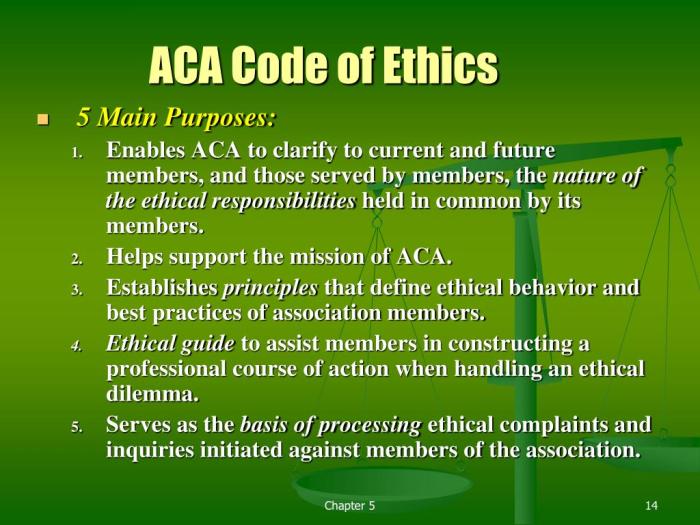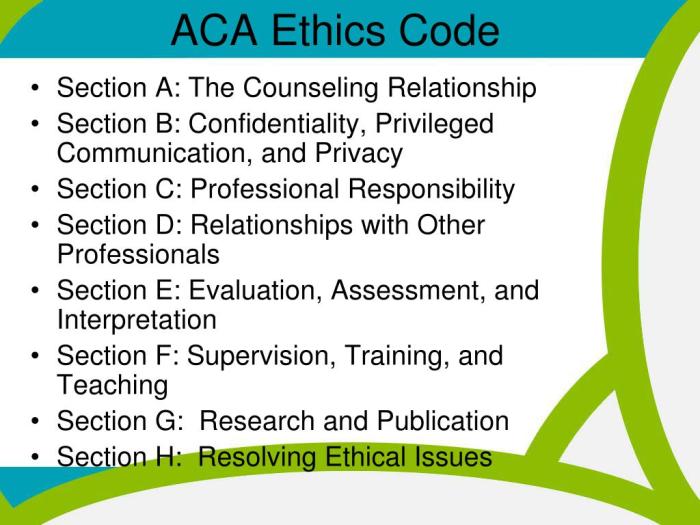The ACA Code of Ethics on Suicidal Clients serves as a comprehensive guide for professionals navigating the delicate and ethically challenging landscape of working with suicidal individuals. This code Artikels ethical principles, assessment strategies, intervention approaches, and self-care practices to ensure the well-being of both clients and professionals.
Understanding and adhering to these ethical guidelines is paramount for counselors, social workers, and other mental health professionals who encounter suicidal clients. By fostering a safe, supportive, and culturally sensitive environment, professionals can effectively assist clients in overcoming suicidal thoughts and behaviors.
1. Ethical Principles in ACA Code for Suicidal Clients: Aca Code Of Ethics On Suicidal Clients

The American Counseling Association (ACA) Code of Ethics provides ethical guidelines for counselors working with suicidal clients. These principles include:
- Beneficence:Acting in the best interests of the client, prioritizing their safety and well-being.
- Nonmaleficence:Avoiding causing harm or distress to the client.
- Autonomy:Respecting the client’s right to make decisions about their own care, while ensuring their safety.
- Confidentiality:Maintaining the privacy of client information, with exceptions for situations involving imminent harm to self or others.
2. Assessment and Intervention Strategies
Assessing suicide risk involves evaluating factors such as:
- Current suicidal thoughts and plans
- History of suicide attempts or ideation
- Substance abuse or dependence
- Mental health conditions
Intervention strategies include:
- Empathy and active listening:Understanding and validating the client’s feelings without judgment.
- Safety planning:Collaborating with the client to develop a plan for managing suicidal thoughts and impulses.
- Crisis management:Providing immediate support and intervention in crisis situations.
3. Collaboration and Referral

Collaborating with other professionals is essential for providing comprehensive care. This may include:
- Mental health specialists
- Medical professionals
- Support services
Referrals are appropriate when the counselor’s skills or scope of practice are insufficient to meet the client’s needs.
4. Cultural Considerations
Cultural factors can influence the presentation and experience of suicidal thoughts and behaviors. Considerations include:
- Cultural beliefs and values:Views on mental illness, suicide, and help-seeking.
- Communication styles:Nonverbal cues, language barriers, and cultural norms.
- Community resources:Availability and accessibility of culturally appropriate support services.
Counselors must be culturally sensitive and understand the unique needs of clients from diverse backgrounds.
5. Self-Care for Professionals

Working with suicidal clients can be emotionally challenging. Self-care strategies for professionals include:
- Maintaining boundaries:Setting clear limits to avoid burnout.
- Seeking support:Consulting with colleagues, supervisors, or therapists.
- Practicing self-compassion:Recognizing and addressing their own emotional needs.
Self-care is essential for maintaining emotional well-being and preventing burnout.
Expert Answers
What are the primary ethical principles Artikeld in the ACA Code of Ethics for Suicidal Clients?
The primary ethical principles include beneficence (doing good), non-maleficence (avoiding harm), autonomy (respecting client self-determination), and justice (ensuring fair treatment).
How does the code address confidentiality in the context of suicide risk?
Confidentiality is generally maintained, but exceptions exist when there is an imminent risk of harm to the client or others. Professionals are ethically obligated to take appropriate steps to protect individuals at risk.
What strategies are recommended for assessing suicide risk?
Best practices include using standardized assessment tools, conducting thorough interviews, and observing client behavior. Empathy, active listening, and non-judgmental communication are crucial for building rapport and eliciting accurate information.